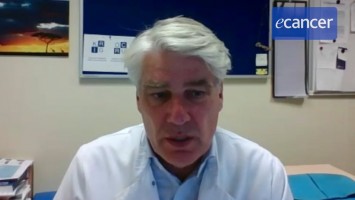I will give a presentation about our study, today also published in Lancet Oncology. This study is about nasopharyngeal carcinoma tumour and it’s almost in China, half of the patients are in China. So the study was focussed on adjuvant chemotherapy. The standard chemotherapy for local regional NPC was concurrent therapy plus adjuvant chemotherapy with cisplatin and 5-fluorouracil. This study which had to compare with a new chemotherapy regimen of gemcitabine plus cisplatin to compare with the standard of care adjuvant chemotherapy which is cisplatin and 5-fluoruracil.
So, in the final analysis we choose the patients with the highest risk of distant metastasis, the patients with stage N2 and N3 with the highest risk. So these patients maybe have a higher risk to develop distant metastasis. The total was 240 patients were randomised to two groups and the PF group, the standard care, is the CCRT concurrent chemotherapy plus an adjuvant PF regimen. Our study group is the CCRT plus GP as adjuvant chemotherapy. After a median follow-up of about 40 months we found that the three-year progression free survival is about 83% but for the PF group it’s about 71%. So after three years there is a progression free survival increase of about 10%. This is the main finding of our study.
But also the GP regimen can reduce the risk of local regional relapse, also reduce the risk of the patients having distant metastasis. Firstly overall survival is still relatively short so there is no difference between the overall survival.
The most important finding of our study is that we tried to recommend that GP, cisplatin plus gemcitabine, is the new adjuvant chemotherapy for NPC patients. That’s the most important finding of our study.
How could this research impact the future treatment of nasopharyngeal carcinoma?
In the future maybe our study will try to recommend maybe the GP regimen will replace the standard of care of the PF regimen in the future. But in the future, maybe we’ll talk about it, maybe even we use concurrent chemotherapy plus GP adjuvant chemotherapy in the about 20% of patients with emergent distant metastasis, for these patients. So in the future maybe we need a trial for the combination with immunotherapy and PD-1 antibodies and try to increase the efficacy for these patients.
And then I expect to still continue to find more effective biomarkers, trying to screen the high-risk patients so you find a more effective, more intensive treatment for these patients. Now, still about 20% of patients will develop a relapse or distant metastases. How can we cure these patients – we need to still explore more treatment, maybe targeted immunotherapy and we still have a long way to go.








